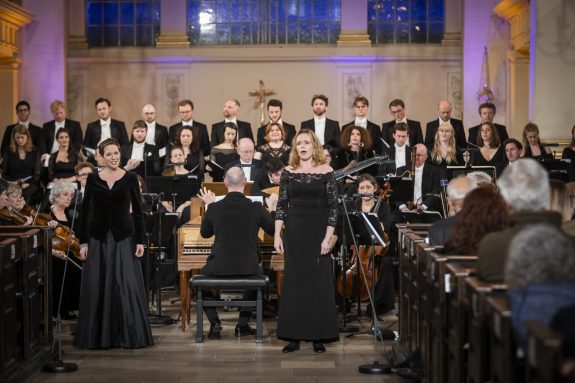 United Kingdom Handel: Soloists, Monteverdi Choir, English Baroque Soloists / Peter Whelan (conductor). St Martin-in-the-Fields, London, 22.3.2024. (AK)
United Kingdom Handel: Soloists, Monteverdi Choir, English Baroque Soloists / Peter Whelan (conductor). St Martin-in-the-Fields, London, 22.3.2024. (AK)

Handel – Israel in Egypt HWV 54
Julia Doyle – soprano
Amy Wood – soprano
James Hall – countertenor
Nick Pritchard – tenor
Jack Comerford – bass-baritone
Tristan Hambleton – bass-baritone
The MCO (Monteverdi Choir & Orchestras) combine the Monteverdi Choir – celebrating its 60th anniversary – and English Baroque Soloists. They are a formidable performing entity, whether separately or together. Their standard is consistently high, any of their concerts guarantees quality.
In theory, the beautiful St Martin-in-the-Fields church – built in the 1720s – is an ideal place for performing Israel in Egypt which was composed a decade and half after the church was completed. Nevertheless, I question this church’s suitability for this composition. The powerful choir numbers provided a tiny echo which lingered on a few seconds after each final chord. I did not notice any echo issues with the solo/duo numbers but choir numbers dominate in this composition. It is of note that Handel did not compose the piece for a church but for the King’s Theatre just a short distance from the church.
Another issue in the church is visibility: I had a wonderful seat but managed to see only half of the chorus/half of the orchestra. Admittedly I had the tallest audience member sitting in front of me but I assume that visibility (like in many churches) was not good on most seats.
Originally Handel set the story in three parts with about two hours and ten minutes music. The first part dealt with ‘The Lamentation of the Israelites for the Death of Joseph’ which in turn was an adaptation of the Funeral Anthem for Queen Caroline ‘The Ways of Zion do mourn’, composed by Handel in 1737.
The three-part version of Israel in Egypt, premiered in 1739, was an immediate flop. Handel acted quickly and for the second performance he dropped the intended first part. The new version consists of Part One: Exodus and Part Two: Moses’s Song. This two-part version is the standard choice for performances and recordings; this is what MCO performs.

Israel in Egypt is in the DNA of MCO. They recorded it with Sir John Eliot Gardiner first in 1978, then in 2009. In between they toured the piece far and wide, for instance in Los Angeles in 1989. However, judging by youth dominating MCO performers, many might have not even been born at the time of the 1978 recording.
The Choir is top: their pitching and diction is excellent; their musicality and disciplined passion is exemplary. The twenty-nine singers included the six soloists who sang all choral music, as the whole choir did, from music. However, for their solos they stepped forward to be near the audience and sang all their solos from memory. I am still not sure how they managed to be in perfect ensemble with the orchestra as they stood behind the conductor’s back. Were there any TV cameras somewhere in the auditorium to show the conductor?
The solo and duo numbers were particularly moving. Each of the six solo singers paid attention to communicating with each other (in the duos) but also with the audience. I was glad to be there.
No complaint about the orchestra either but for me the singers carried the torch. The latter owned their parts (from memory), the orchestra played their parts (very well).
Conductor Peter Whelan was in full control and presented a coherent, passionate view of this demanding choral piece. It was beautiful. However, experiencing the late Sir Charles Mackerras’s Handel operas first hand (that is in the orchestra pit), I missed sharper rhythms.
The text for Israel in Egypt comes from the Bible but in the current political climate I felt uncomfortable with it. My deepest gratitude to whoever wrote the opening page (presumably from the St Martin-in-the-Fields team) for the programme notes: ‘This concert was programmed long before the current war in Gaza began …[ Israel in Egypt] serves as a timely reminder, that in a shared world we must continue to stand up to discrimination and oppression.’
Agnes Kory
